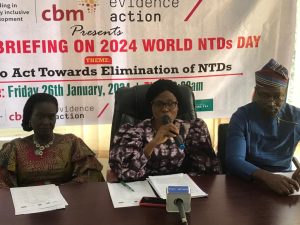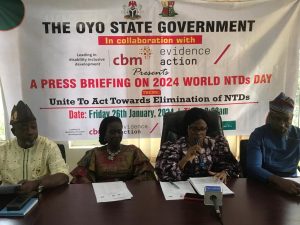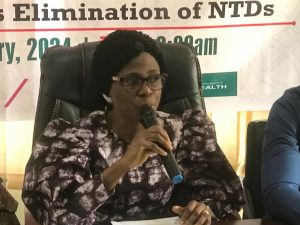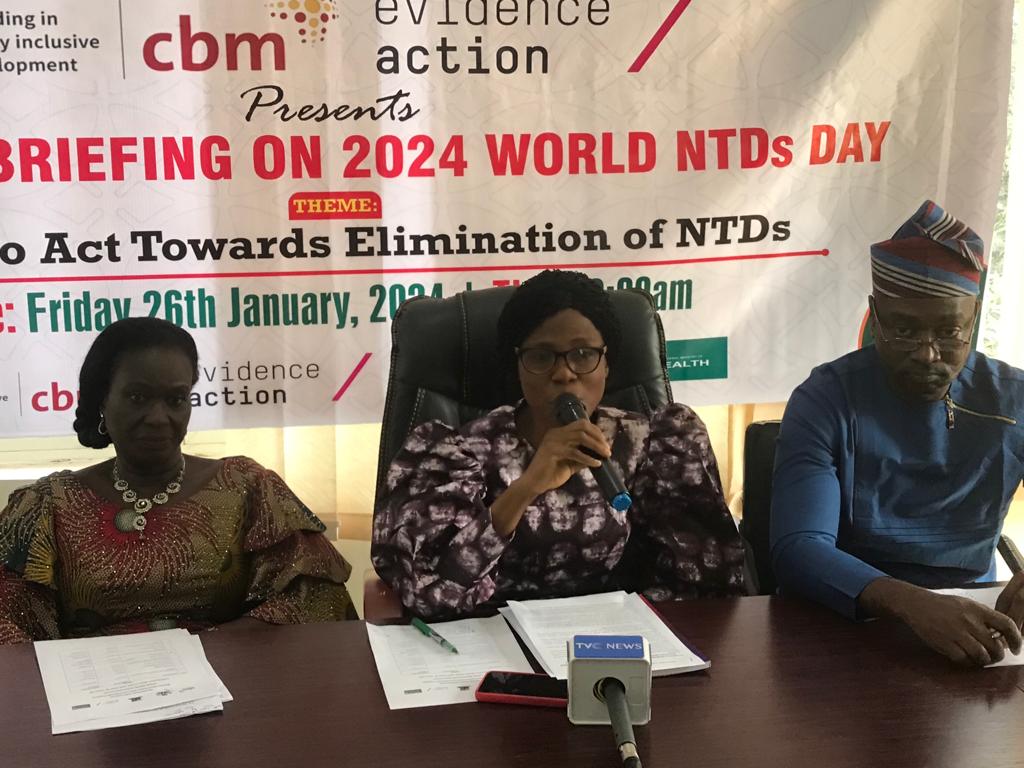••urges stakeholders to join govt on fight against NTDs
The Neglected Tropical Diseases (NTDs) if not properly treated could lead to disability and stigmatization, hence there is need for serious awareness on the diseases from all the critical stakeholders.
Neglected Tropical Diseases according to Oyo State Commissioner for Health, Dr. Oluwaserimi Ajetunmobi are group of diseases that are largely found in tropical areas of the world where they thrive among people living in impoverished communities.



Addressing journalists at a press briefing on 2024 World NTD Day at the Conference Room of the Ministry of Health, Agodi, Ibadan on Friday, Dr. Oluwaserimi Ajetunmobi noted that Neglected Tropical Diseases thrive in area where access to clean water sanitation and essential medicine is scarce.
While speaking on the effect of Neglected Tropical Diseases, Dr. Oluwaserimi said, “NTDs if untreated could lead to disability and stigmatization.” She sighted an example as Onchocerciasis (River Blindness) if not treated could lead to loss of sight, while Schistosomiasis (SCH) and Soil Transmitted Helminthes (STH) can result in anaemia.
She further explained that, “the long-term effects of some NTDs can be catastrophic, which can lead to loss of life. The devastating effects of NTDs on our people cannot be over emphasized, hence the need for all to come together to combat the diseases.”
While speaking on efforts of the state government towards eradicating Neglected Tropical Diseases in the state, the Dr. Oluwaserimi said, “Our action is to raise the profile of NTDs, the suffering they cause and to gather support towards their control, elimination and eradication, in-line with programmatic targets set out in the World Health Organization (WHO) 2023 NTD road map which includes decreasing the number of people requiring intervention for NTDs by 90 percent.
She further noted that the state government through innovation and intensify disease management, preventive chemotherapy by distributing anthelmintic medicines, mass drug administration of praziquantel to school aged children, vector control through mass spraying of insecticides, veterinary public health, provision of safe water, sanitation and hygiene, among others.
“This year, the world NTD Day theme seeks to continue the momentum from previous years and carry through the thread of taking NTDs out of isolation, identifying opportunities for integrated action on NTDs and the continued call for investment in NTDs.”
“NTDs programmes strengthen health systems by increasing access to hard-to-reach people and training community health workers who provide a first line primary healthcare, everyone has a key role to play by bringing renewed attention to NTDs, building political will and mobilizing resources and putting individuals and communities at the center of the response, we can collectively generate the attention and resources needed to deliver against the elimination of NTDs in Oyo state, that is the reason why Oyo state government also joins the global community to celebrate the 2024 world NTD Day.” Oluwaserimi said.
Earlier in his opening remarks, the Executive Secretary of the state Primary Care Board, Dr. Muideen Babatunde Olatunji maintained that the state government has been playing a central role in implementing policies, allocating resources and coordinating efforts to control and eliminate these diseases in the state.
Olatunji further stressed that in 2023 alone, Oyo state government release over 27 million naira to support NTDs program activities in the state, including drug distribution, public awareness campaigns among other activities.”
He said, “The NTD unit of Oyo state Primary Health Care Board is saddled with the responsibility of carrying out all the control strategies through safe and cost-effective preventive chemotherapy (PCT) in collaboration with the willing NGOs.”
Dr. Olatunji in his words listed four NTDs that are endemic in the state as soil Transmitted Helminthes, Schistosomiasis, Lymphatic Filariasis and Onchocerciasis.
“Onchocerciasis is transmitted through bite of an infected female blackfly of the simulium species while Lymphatic Filariasis (Elephantiasis) is transmitted through exposure to bite of infected mosquitoes, of anopheles, Culex and aedes species. Schistosomiasis is contracted through contact with contaminated water or streams. Soil Transmitted Helminthes is transmitted through ingestion of contaminated foods and water, and through contact with contaminated soil in case of hookworms.” Olatunji said.

